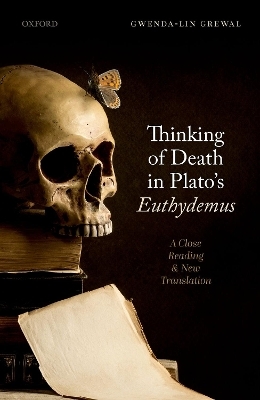
Thinking of Death in Plato's Euthydemus
A Close Reading and New Translation
Seiten
2022
Oxford University Press (Verlag)
978-0-19-284957-1 (ISBN)
Oxford University Press (Verlag)
978-0-19-284957-1 (ISBN)
Thinking of Death places Plato's Euthydemus among the dialogues that surround the trial and death of Socrates, including a new translation of the Euthydemus that pays careful attention to grammatical ambiguities, nuances, and wit in ways that substantially expand the reader's access to the dialogue's mysteries.
Thinking of Death places Plato's Euthydemus among the dialogues that surround the trial and death of Socrates. A premonition of philosophy's fate arrives in the form of Socrates' encounter with the two-headed sophist pair, Euthydemus and Dionysodorus, who appear as if they are the ghost of the Socrates of Aristophanes' Thinkery. The pair vacillate between choral ode and rhapsody, as Plato vacillates between referring to them in the dual and plural number in Greek. Gwenda-lin Grewal's close reading explores how the structure of the dialogue and the pair's back-and-forth arguments bear a striking resemblance to thinking itself: in its immersive remove from reality, thinking simulates death even as it cannot conceive of its possibility. Euthydemus and Dionysodorus take this to an extreme, and so emerge as the philosophical dream and sophistic nightmare of being disembodied from substance. The Euthydemus is haunted by philosophy's tenuous relationship to political life. This is played out in the narration through Crito's implied criticism of Socrates-the phantom image of the Athenian laws-and in the drama itself, which appears to take place in Hades. Thinking of death thus brings with it a lurid parody of the death of thinking: the farce of perfect philosophy that bears the gravity of the city's sophistry. Grewal also provides a new translation of the Euthydemus that pays careful attention to grammatical ambiguities, nuances, and wit in ways that substantially expand the reader's access to the dialogue's mysteries.
Thinking of Death places Plato's Euthydemus among the dialogues that surround the trial and death of Socrates. A premonition of philosophy's fate arrives in the form of Socrates' encounter with the two-headed sophist pair, Euthydemus and Dionysodorus, who appear as if they are the ghost of the Socrates of Aristophanes' Thinkery. The pair vacillate between choral ode and rhapsody, as Plato vacillates between referring to them in the dual and plural number in Greek. Gwenda-lin Grewal's close reading explores how the structure of the dialogue and the pair's back-and-forth arguments bear a striking resemblance to thinking itself: in its immersive remove from reality, thinking simulates death even as it cannot conceive of its possibility. Euthydemus and Dionysodorus take this to an extreme, and so emerge as the philosophical dream and sophistic nightmare of being disembodied from substance. The Euthydemus is haunted by philosophy's tenuous relationship to political life. This is played out in the narration through Crito's implied criticism of Socrates-the phantom image of the Athenian laws-and in the drama itself, which appears to take place in Hades. Thinking of death thus brings with it a lurid parody of the death of thinking: the farce of perfect philosophy that bears the gravity of the city's sophistry. Grewal also provides a new translation of the Euthydemus that pays careful attention to grammatical ambiguities, nuances, and wit in ways that substantially expand the reader's access to the dialogue's mysteries.
Gwenda-lin Grewal is the Onassis Lecturer in Ancient Greek Thought and Language at the New School for Social Research. Her publications include English translations of Plato's Phaedo (2018) and Cratylus (forthcoming) and the book Fashion
Introduction
1: This, That, and The Other
2: The Dual
3: Love and Stress
4: All Chorus and No Plot
5: Good Luck
6: Doing Less More
7: Contradiction
8: Wonder: The Beginning and End of Philosophy
9: Crito Interrupts Socrates
10: Dog-father and Father-dog
11: Predication, Equality, and Ritual Cannibalism
12: Death by Humor
EUTHYDEMUS - A New Translation
| Erscheinungsdatum | 11.07.2022 |
|---|---|
| Verlagsort | Oxford |
| Sprache | englisch |
| Maße | 160 x 240 mm |
| Gewicht | 558 g |
| Themenwelt | Literatur ► Klassiker / Moderne Klassiker |
| Geschichte ► Allgemeine Geschichte ► Altertum / Antike | |
| Geisteswissenschaften ► Philosophie ► Philosophie Altertum / Antike | |
| ISBN-10 | 0-19-284957-3 / 0192849573 |
| ISBN-13 | 978-0-19-284957-1 / 9780192849571 |
| Zustand | Neuware |
| Informationen gemäß Produktsicherheitsverordnung (GPSR) | |
| Haben Sie eine Frage zum Produkt? |
Mehr entdecken
aus dem Bereich
aus dem Bereich


